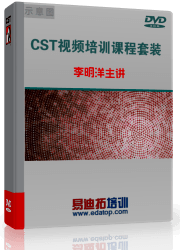- 易迪拓培训,专注于微波、射频、天线设计工程师的培养
Damped Transient Response in CST MWS
录入:edatop.com 点击:
Hello All,
In CST MWS, I'm using a square pulse, current signal as an excitation signal sent from Design Studio to Microwave Studio using the co-simulation feature. I am interested in the transient behavior of a wide-band antenna after receiving such a square pulse. I was hoping to see a damped sinusoidal response with time after the pulse due to losses in the metal and so forth, but I do not see any damping. The antenna seems to just keep ringing, so to speak. The material of the antenna is annealed copper so it is not a perfect electric conductor and shouldn't exhibit such behavior. Could anyone lend any ideas of how to accurately model dampening in resonant structures? Should I choose a material with higher resistance? Should I use CST's AR filter? I've heard it can predict damping affects in post-processing but I have never used it before. Thank you in advance!
In CST MWS, I'm using a square pulse, current signal as an excitation signal sent from Design Studio to Microwave Studio using the co-simulation feature. I am interested in the transient behavior of a wide-band antenna after receiving such a square pulse. I was hoping to see a damped sinusoidal response with time after the pulse due to losses in the metal and so forth, but I do not see any damping. The antenna seems to just keep ringing, so to speak. The material of the antenna is annealed copper so it is not a perfect electric conductor and shouldn't exhibit such behavior. Could anyone lend any ideas of how to accurately model dampening in resonant structures? Should I choose a material with higher resistance? Should I use CST's AR filter? I've heard it can predict damping affects in post-processing but I have never used it before. Thank you in advance!
申明:网友回复良莠不齐,仅供参考。如需专业解答,请学习易迪拓培训专家讲授的CST视频培训教程。
上一篇:CST (Computer simulation Technology) questions. Curious1
下一篇:Grounded CPW simulation using CST

